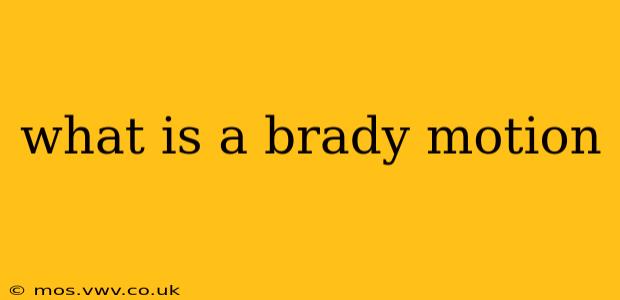A Brady motion, in the context of criminal law, is a request made to a court by a defendant's attorney. It's based on the landmark Supreme Court case Brady v. Maryland (1963), which established the legal principle that the prosecution must disclose all evidence that is material to the guilt or innocence of the defendant, even if that evidence is exculpatory (tending to clear the defendant) or impeaching (tending to discredit a witness).
Essentially, a Brady motion is a formal request for the prosecution to turn over any evidence that could help the defense. Failure to do so is a violation of the defendant's due process rights under the Fourteenth Amendment. This isn't just about evidence that directly proves innocence; it also encompasses information that could cast doubt on the prosecution's case or the credibility of their witnesses.
What Kind of Evidence is Covered by a Brady Motion?
The scope of a Brady motion is broad and encompasses various types of evidence, including:
-
Exculpatory evidence: This is evidence that tends to show the defendant is not guilty. This could range from witness statements contradicting the prosecution's narrative to forensic evidence pointing away from the defendant.
-
Impeachment evidence: This is evidence that could be used to challenge the credibility of a prosecution witness. Examples include prior convictions, inconsistent statements, or evidence suggesting bias or motive to lie.
-
Missing witness information: If the prosecution knows about a potential witness who could provide relevant information but has not contacted them, the defense may request information about them via a Brady motion.
-
Evidence of police misconduct: This could include evidence of fabricated evidence, coerced confessions, or violations of the defendant's rights during arrest or interrogation.
What Happens if a Brady Violation Occurs?
If a prosecutor fails to disclose material evidence, it's considered a Brady violation. The consequences can be severe:
-
Dismissal of charges: In some cases, particularly if the withheld evidence is highly significant, the court may dismiss the charges against the defendant.
-
Suppression of evidence: The court may prevent the prosecution from using certain evidence at trial if it was improperly withheld.
-
New trial: If the defendant was convicted and a Brady violation is later discovered, they may be entitled to a new trial.
How Does a Brady Motion Work in Practice?
The process typically involves the defendant's attorney filing a formal motion with the court, requesting specific types of evidence or information. The prosecution then has an opportunity to respond, disclosing the requested information or explaining why it is not subject to disclosure. The judge reviews the motion and the prosecution's response to determine whether a Brady violation has occurred.
Frequently Asked Questions (FAQs)
What is the difference between a Brady motion and a discovery request?
While both involve requesting evidence from the prosecution, a discovery request is broader and covers all potentially relevant evidence. A Brady motion is specifically focused on evidence that is material to the defendant's guilt or innocence, as defined by Brady v. Maryland.
How common are Brady violations?
The frequency of Brady violations is difficult to quantify definitively, as many are discovered and resolved without public knowledge. However, cases involving significant Brady violations are reported regularly, highlighting the ongoing importance of this legal principle.
Who benefits from a Brady motion?
Primarily, the defendant benefits from a Brady motion as it protects their right to a fair trial. However, a properly functioning Brady process benefits the entire judicial system by ensuring accuracy and promoting confidence in the justice system.
This information is for educational purposes only and should not be considered legal advice. Consult with a legal professional for advice on specific legal matters.
